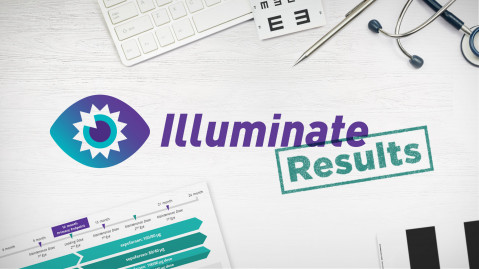The information within this community update is now out of date but provides information that was correct at the time of publication. Please read our latest community news update: ProQR agreement with Laboratoires Théa for sepofarsen and ultevursen inherited retinal disease programs.
Sepofarsen news update Phase 2/3 Illuminate trial results of sepofarsen in CEP290-mediated LCA10
In top-line analyses, the Illuminate study did not meet its primary endpoint of Best Corrected Visual Acuity (BCVA) and secondary endpoints. No benefit was observed in either sepofarsen treatment arm versus the sham treated control arm.

What is LCA10?
Leber congenital amaurosis (LCA) is the most common genetic cause of childhood blindness and affects about 15,000 patients in the Western world. For most patients there is currently no approved treatment available. The disease usually appears in the first year of life and is characterized by severe loss of vision. Other symptoms can include rapid eye movement (nystagmus), eye-poking, night blindness and sensitivity to light (photophobia). Depending on the mutation, complete loss of vision can occur during early childhood.
Illuminate
Illuminate is the name of a clinical study which aimed to explore whether the investigational RNA therapy sepofarsen was effective and safe for individuals with CEP290-mediated LCA10.
Illuminate, was a randomized, sham-controlled trial, enrolled 36 participants aged eight years or older with genetically confirmed LCA10 due to the c.2991+1655A>G (p.Cys998X) mutation in the CEP290 gene.
The study took part at 14 study sites in nine countries.
Participants were randomized to three equal groups of:
- the target registration dose sepofarsen (160 μg/80 μg loading dose/maintenance doses),
- a low dose of sepofarsen for masking (80 μg/40 μg loading dose/maintenance doses),
- or sham procedure.
With sepofarsen administered via intravitreal injection (IVT) and the sham procedure mimicking an injection with no medicine or injection given.
Clinical trials are used by researchers to find out whether new medicines are effective and safe.
Illuminate trial aimed to find out whether sepofarsen was effective at improving vision, safe and well-tolerated.
We will now take some time as a company to analyze the data further.
This was not the outcome we had hoped for
“This was not the outcome we had hoped for and we share in the disappointment many are feeling in the community,” said Benjamin R. Yerxa, Chief Executive Officer at the Foundation Fighting Blindness. “We will continue to work alongside ProQR to learn more from the ongoing analyses and as they work to advance RNA therapies to potentially help children, adults, and families who are affected by rare genetic eye diseases.”
Further reflections
The Illuminate trial results are unexpected and disappointing, especially for people living with LCA10
“Given the results observed in earlier studies of sepofarsen, the Illuminate trial results are unexpected and disappointing, especially for people living with LCA10,” said Daniel A. de Boer, Founder and CEO of ProQR Therapeutics. “ProQR was founded with the goal of developing RNA therapies for patients with high unmet medical need, and we will continue to advance our robust pipeline of therapies for genetic eye disease. We are deeply grateful to all of the participants, their supporters, and investigators who participated in the Illuminate study.”
We will continue to work with ProQR to understand the data as they advance therapies for IRDs
“LCA10 is a devastating, very difficult-to-treat retinal disease resulting in blindness, for which there are no therapies,” said Dr. Bart Leroy, Head of the Ophthalmology Department at Ghent University Hospital and Professor of Ophthalmology and Ophthalmic Genetics at Ghent University, Ghent, Belgium and Attending Physician for Ophthalmic Genetics and Retinal Degenerations at The Children's Hospital of Philadelphia. “We will continue to work with ProQR to understand the data as they work to advance therapies for inherited retinal diseases.”
ProQR thanks the community
The ProQR team would like to thank the study participants, their supporters, the investigators, and their staff for the support in the development in this trial. ProQR remains committed to making a significant and positive impact on the lives of those affected by genetic eye conditions.
Stay in touch
For quarterly news and future study participation opportunities sign up to the ProQR Eye Connect Newsletter or follow us on social media.
If you have any questions, please contact ProQR at patientinfo@proqr.com.

